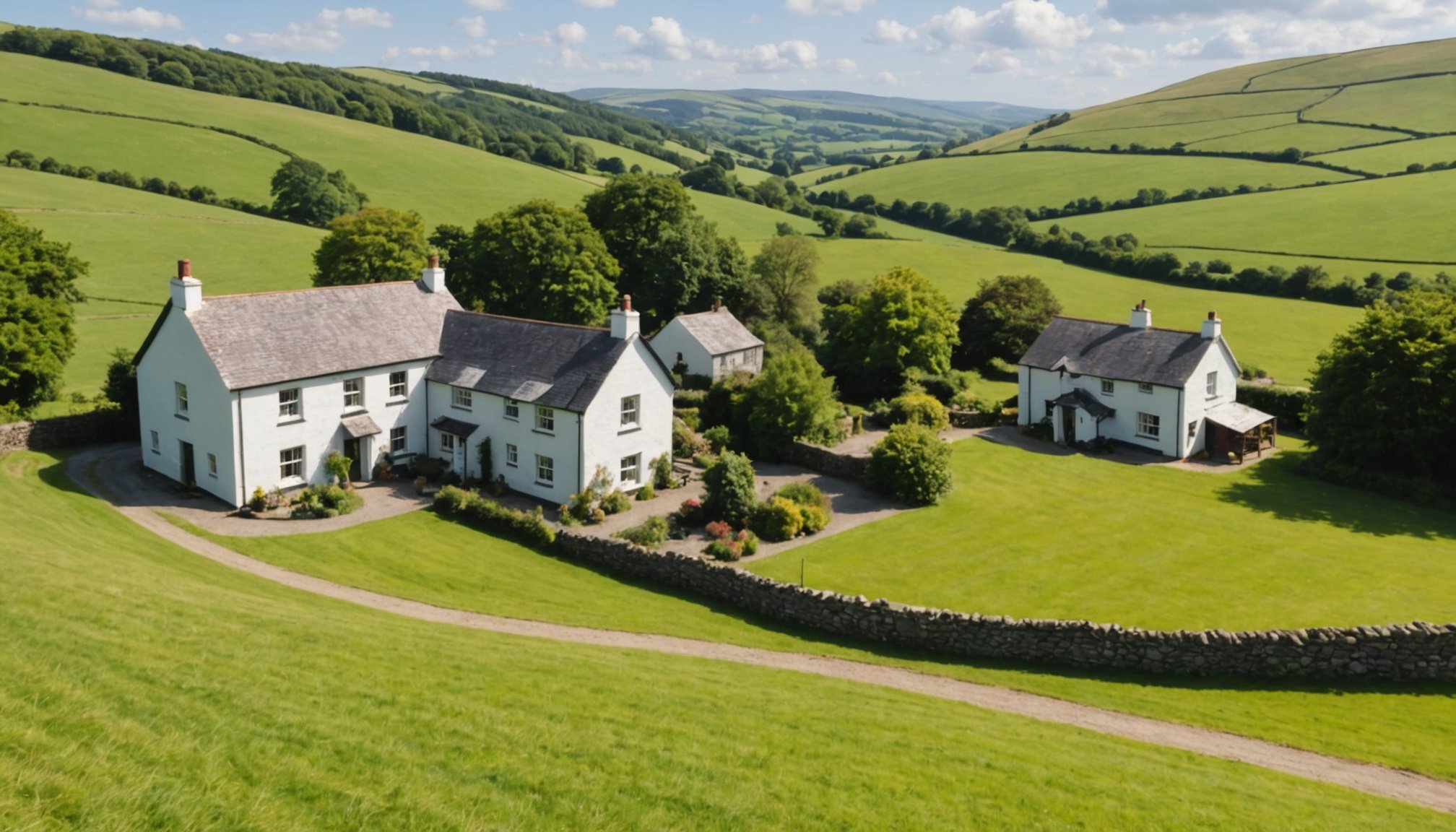Understanding the Appeal of Farmhouses in Rural Wales
The farmhouse lifestyle holds a distinct charm, especially within the scenic landscapes of Rural Wales. This allure is not merely about the aesthetics; it’s intricately tied to the rich heritage embedded in Welsh farmhouses. These structures stand as symbols of a bygone era, preserving the stories and traditions that shape the region’s identity.
Living in a farmhouse fosters an emotional connection to the land and community. Rural Wales offers a sense of tranquillity and belonging that urban environments often lack. This emotional benefit extends to a slower, more mindful pace of life, where the beauty of nature is ever-present.
This might interest you : Brexit and Its Implications for Non-UK Residents: Navigating Property Ownership Challenges
Moving to the countryside brings significant lifestyle changes. Residents find that the transition to a rural setting enhances their well-being, encouraging outdoor activities and fostering a strong community spirit. The simplicity and authenticity of farmhouse living attract those seeking respite from the fast-paced hustle of city life. The unique charm and the sense of history make Rural Wales an appealing destination for individuals yearning to reconnect with nature and embrace a more fulfilling way of life.
Key Location Considerations for Your Dream Farmhouse
When selecting a rural property location for your dream farmhouse, consider the distance to essential services and amenities. It’s crucial to have convenient access to necessities like grocery stores, medical facilities, and schools. Proximity to these services can greatly enhance the quality of life in rural settings.
Also to see : Navigating the Challenges of Rural Estate Management in Northern Ireland: Key Insights and Solutions
Another important factor is the local community’s culture. Understanding and aligning with the community’s values ensures a more harmonious living experience. Research about local traditions and community events to see if they resonate with your family’s lifestyle.
The beauty of natural surroundings is often a primary allure of rural properties. Scenic views not only offer aesthetic pleasure but may also increase the property’s value. Consider viewpoints, bodies of water, and greenery when evaluating potential locations.
Community access also plays a pivotal role. Transportation links, road conditions, and internet connectivity should be evaluated to ensure they meet your needs. Some rural properties can feel isolated, making community accessibility crucial for staying connected both locally and digitally.
By weighing these essential location considerations, you can find a rural property that enhances both your lifestyle and personal fulfilment.
Essential Property Features to Look For
Choosing a farmhouse requires careful evaluation of essential features. Homebuyers often focus on farmhouse features that complement their lifestyle. Features such as expansive kitchens, charming fireplaces, and robust porches typically top the list of preferences. When inspecting a property, consider how these elements align with your everyday needs.
Deciding on the ideal property size is equally important. While large properties offer more space and freedom, they also demand more maintenance. Balancing the desire for vast land with your ability to manage it is crucial. Assess how much land you genuinely require, whether for gardening, pets, or recreation, to avoid overwhelming upkeep.
Renovations or restorations present another angle to consider. Farmhouses often carry historical charm, but this may involve updating certain elements. Evaluate the extent of renovations needed. Minor cosmetic changes can enhance aesthetics, while significant restorations might be necessary for function and safety. Understanding the potential costs and complexities of such projects will help you make informed decisions about your future home.
Budgeting and Financial Planning for Purchase
Purchasing a farmhouse requires careful financial planning to avoid unexpected setbacks. One of the first steps is establishing a realistic budget that covers not only the initial purchase but also ongoing maintenance costs. It’s essential to factor in unique expenses associated with rural properties, such as structural repairs or upgrades to outbuildings.
Exploring financing options can also prove advantageous. Many lenders offer specific products that cater to rural property purchases. It’s beneficial to research grants or subsidies that may be available for farmhouses, particularly those aimed at promoting rural development or sustainable practices.
However, be mindful of potential hidden costs that often accompany rural property purchases. These could include higher transportation costs due to distance from urban centres, increased insurance premiums, or necessary adjustments to utilities like well water and septic systems. A thorough inspection and consultation with a local real estate expert can help mitigate surprises.
In summary, a comprehensive farmhouse budgeting approach considers both expected and surprise expenses. Aligning finances with these insights ensures a more seamless transition into owning a picturesque rural property.
Legal Aspects of Buying a Farmhouse in Wales
When considering the purchase of a farmhouse in Wales, navigating the legal requirements is crucial. One of the first steps is understanding the land use regulations and zoning laws that dictate how your property can be used. These regulations vary depending on whether the land is classified as agricultural land, residential, or mixed-use. If the land is designated for agricultural use, certain activities might be restricted to farming purposes only.
Another critical aspect is the importance of securing a clear property title and conducting thorough survey assessments. The title ensures that there are no disputes over ownership, while a detailed survey will highlight any boundary issues or encroachments. This step is essential to avoid future legal complications.
Moreover, agricultural land ownership comes with its own set of legalities. You may need to comply with specific Welsh agriculture policies and obtain necessary permits for any developments or changes to the land. Understanding these requirements upfront can save potential headaches and legal troubles later on. Investing time in comprehensively understanding these factors can lead to a smoother farmhouse purchase experience and ensure you remain compliant with local regulations.
Exploring Farming Potential and Lifestyle
When considering the farming opportunities on a property, it’s crucial to assess the viability of farming activities. This involves evaluating the soil quality, climate, water availability, and infrastructure. A thriving farm requires a foundation that supports diverse crops and livestock.
Sustainable agriculture presents a compelling opportunity for farmers. By adopting eco-friendly practices such as crop rotation, organic farming, and the use of renewable resources, farming operations can become both profitable and environmentally responsible. These methods are designed to preserve natural ecosystems and reduce waste, aligning with global efforts to combat climate change.
Understanding the lifestyle implications of managing a farm is equally important. Transitioning to farming entails shifts in daily routines and responsibilities. It’s a lifestyle that demands patience, resilience, and a strong work ethic. Farmers often find themselves closely connected to the land, leading to a fulfilling yet demanding lifestyle.
By exploring sustainable practices, farmers can contribute to local food security and minimize environmental impact. This, paired with the personal and professional rewards of the farming lifestyle, highlights the significant potential farm properties provide. The opportunities are plentiful for those ready to embrace the challenges and rewards of agricultural life.
Community Insights and Building Local Connections
Engaging with the local community is a vital aspect of enriching your life experience. Community engagement fosters a sense of belonging and offers numerous social opportunities. By participating in local groups, you can develop a deeper understanding of the unique dynamics and values that characterize the area.
Discovering local events and cultural activities allows you to immerse yourself in the local culture. Attend community fairs, art exhibitions, or music festivals to experience the diverse offerings of your new surroundings. These events provide excellent social opportunities to meet like-minded individuals.
Building relationships with neighbors and local businesses is essential to establishing a supportive network. Take the time to introduce yourself and learn about the stories behind local shops and services. This not only builds goodwill but can also provide insider knowledge about the best spots and hidden gems in the area.
- Join community clubs or associations to stay informed.
- Volunteer for local initiatives to contribute positively.
- Participate in neighborhood events.
By actively participating in the community, you deepen your connection to the local culture, creating a more fulfilling and engaging living experience.
Visual Inspiration and Anecdotes from Farmhouse Owners
Dive into the charming world of Welsh farmhouses through captivating tales and stunning visuals. These farmhouse stories bring to life everyday moments that capture the essence of rustic living. From morning coffee on sun-dappled porches to the quiet hum of kitchen chatter, the anecdotes from farmhouse owners reveal a lifestyle steeped in tradition and simplicity.
Explore visual tours that showcase sprawling landscapes, weathered yet beautiful stone facades, and cozy interiors brimming with character. The vibrant details of these homes paint a picture of serenity and charm, appealing to those longing for a slice of pastoral paradise.
Owner experiences layer the narrative with heartfelt testimonials. Many speak of the solace found in the countryside’s embrace, describing a life where evenings are spent by the fireplace, and days are joyous in the fields. These personal experiences not only authenticate their stories but also invite you to envisage a lifestyle where history meets nature.
These encounters with Welsh farmhouse owners, both visually compelling and deeply personal, invite those enamoured with the countryside to dare dream of their own quaint retreat.











